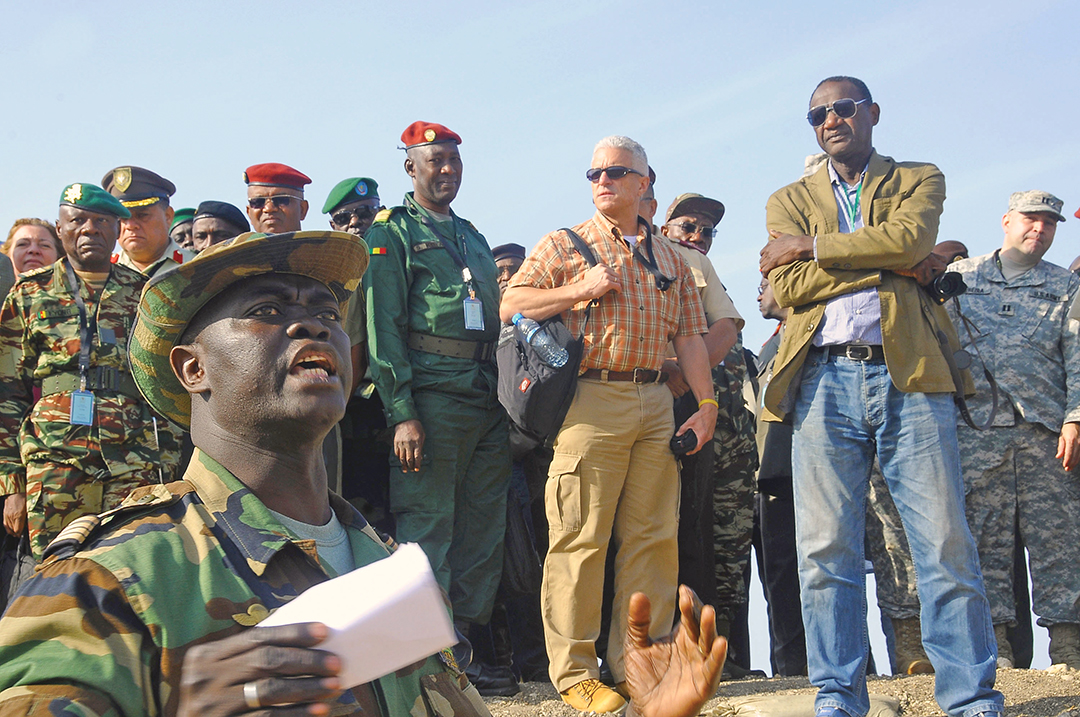Security professionals need to be more proactive in dealing with reporters, particularly when the news is bad
ADF STAFF
The relationship between the military and the media is seldom easy, but in certain parts of Africa, the relationship seems particularly strained.
Prof. Bizeck Phiri of the University of Zambia said African nations’ path to independence in the 20th century and their post-independence woes are partially to blame for some communications difficulties.
“In the 1960s, when most African countries attained independence from their colonial masters, the public trusted the political leaders and those in authority,” he told military leaders at an African Conference of Commandants meeting in Zambia in 2015. “The citizens accepted their word — written or unwritten. However, by the early 1970s, this trust began to be replaced by distrust of those in authority, and the uncritical acceptance was quickly replaced by critical skepticism.”
Modern communications technology, Phiri said, played a role in the growing distrust.
“In today’s world, news spreads very fast,” he said. “The radio and television play an ever more important role in defining the perceptions of the public. Information spreads very fast and, therefore, people do not want one-sided propaganda irrespective of the source — whether government, political parties or the media itself.”
Retired Maj. Gen. A.C. Olukolade of Nigeria told the conference that Africa’s militaries deserve a better reputation than they have gotten in recent years. Military commanders should be eager to tell their stories.

Phiri and others say some militaries need to rethink their responsibilities to keep the public informed about what they do. Retired U.S. Brig. Gen. James Schwenk, writing about the need for militaries to give useful interviews, said some public affairs officers view their job too narrowly. They are satisfied to release only information about “exercises, procurement, promotions and similar good news.”
The real obligation of militaries, Schwenk said, “includes discussing the bad news that is also inherent in the military, such as training accidents, other disasters and criminal misconduct.” The military is also obligated, he said, to correct the record when misleading or false information finds its way to the media.
Educators and advisors to the military readily acknowledge that there is information that must be kept from the public, such as intelligence matters, classified information and troop positions during times of conflict. Anything that can compromise military safety, intelligence sources and the country should be kept confidential. But these advisors say that militaries all over the world place entirely too much information in the “classified” category.
Paul Manson, former chief of the Canadian Department of Defense, summed up the rift in a study on media relations: “There is a legacy of mistrust on the part of the media towards the military, who were often seen to be restricting information more to protect themselves and their reputations than to protect national security. The military’s historic obsession with secrecy has exacted a heavy price in the lingering suspicion, which colors today’s relationship.”
The media share the blame for these strained relationships because of the nature of news-gathering. Journalists, now more than ever, face constant, competitive deadline pressure. In their rush to produce stories, they can oversimplify complex issues. And, since almost all news organizations are driven by profits, they tend to gravitate to whatever will sell, including shocking and salacious news. In this way, media outlets are no different from any other business.
When Josée-Ann Paradis was a lieutenant colonel in the Canadian Armed Forces, she wrote about the culture clash between the military and the media. She began her paper with a quote from a 1954 study that observed, “There can be few professions more ready to misunderstand each other than journalists and soldiers.” Paradis said the tension came from “the difficult question of how much information could and should be given to journalists.” But Paradis noted that journalists and Soldiers probably have more in common than they realize.
“Both professions are highly structured and unique, possess a distinct code of ethics, and rely on teamwork to get the job done,” she wrote. “Staffs in newsrooms and operations rooms are composed of hard-working, dedicated professionals striving to make crucial decisions based on limited available information; they are subjected to immense pressures as they wrestle with the problem of making decisions against the clock.” And, she noted, “both institutions share a common purpose — the upholding of a free, open and democratic society for the citizens of the country they serve.”
Phiri told ADF that the media and the military do share many common traits. But, he said, the military can never be independent of the government, while, in a perfect world, the media must be entirely free from government pressure.
GET THE BAD NEWS OUT
One particular point that Phiri and others emphasize is the need for militaries, and indeed, all organizations, to strive for immediate and full disclosure during crises.
“The best approach to use when scandals break out is to face the situation squarely and get the story out quickly, because headlines are always bigger if the press believes there has been an attempt to cover up,” Phiri said. “Since the speed of modern communications can transmit television pictures via satellite from a military area of operation to a mass audience faster than information can travel over the military communications network, it is important that the military itself reacts quickly. Maximum exposure with minimum delay is always key in times of crisis. Experience proves that it is better to tell bad news sooner rather than later.”
Trying to keep a lid on an unfavorable story, specialists say, will force the media to speculate. “Cutting off information will not restrict the news flow,” Phiri said. “Telling the media nothing only forces them to guess, and they will often guess right. However, the final product may end up biased, inaccurate or shown out of context.”
Before delivering good or bad news, militaries should educate the media. Phiri stressed the importance of the military assisting the media “in educating the public on the conduct of military operations and the military lifestyle as a whole.” Waiting until a crisis or emergency to establish a relationship with the media is too late.
“Here I have in mind open days and exercises where the media are invited and given guided tours and information,” Phiri said.
In his presentation to the commandants, Olukolade warned that with the advent of smartphones and social media, there has never been a time in human history when information traveled so quickly. Militaries must embrace this new technology and culture of increased openness or risk being left behind.
“Within a rather short time, any kind of message — be they text, voice messages, photographs, artworks or video — can be passed around an entire country in ways no authority is today competent of regulating or monitoring. The onus, therefore, is on the public, governments and the military hierarchy to speedily come to terms with the rapid advancements in the information and communication field.”
Experts Offer Tips on Giving Interviews
ADF STAFF
Media consultants agree on the fundamentals of giving interviews and conducting press conferences. Here are some of their tips:
Avoid giving simple yes or no answers: According to U.S. Army media specialists, giving a simple answer gives away an opportunity to deliver a positive message about your military organization. For instance:
Question: “Is it true that one of your officers was reprimanded for sexual harassment?”
Answer: “The Army has zero tolerance for this type of behavior, so we did reprimand an officer who made intolerable comments to a co-worker. We do everything possible to ensure that our people work in a friendly, professional atmosphere.”
Always be prepared: Marketing and management specialist Joanna Krotz said you may be an expert, able to talk about your specialty with authority, but you still have to prepare your remarks for the media. “The fundamentals always come down to preparation,” she said. “How will you respond to tough or hostile questions? Do you have a clear, honest and appropriate answer to the most negative query you can imagine?”
Know your media contacts: Media trainers say you should try to break the ice with journalists by asking them about their background, such as where they grew up and what kinds of stories they have covered. The goal is to make yourself more likable. Military communications specialists in the United States say you should answer questions and deliver messages “with interest, passion and conviction.”
Don’t go off the record: There is no advantage of any kind to giving a journalist information that they are not supposed to use. Going off the record is not an enforceable contract with a journalist. In other words, what you said off the record might still end up being circulated.
Watch your body language: Even in positive news conferences and meetings, experienced spokesmen can sometimes look tense, awkward or give the impression that they are not credible. One public relations specialist advises walking around or doing some exercises before giving interviews. Others say that public affairs officers should make videos of practice interviews and staged press conferences, study the results, and seek feedback.
If things go wrong, stop and regroup: If an interview or news conference takes a bad or unexpected turn, call a time out. Ask for a break, go to the restroom or get some water. Give yourself time to step back and defuse the situation.
Learn how to transition back to your topic: Journalists often ask unexpected questions or questions that are off topic. If you know the answer, give it simply and quickly, and transition back to your message.
Learn how to say “I don’t know”: Consultants and educators often believe that saying “I don’t know” exposes them as unreliable or unprofessional. But in most walks of life, including being a military spokesman, it’s better to profess ignorance than to ad-lib something that may turn out to be wrong or make you look foolish. Follow up “I don’t know” with “Let me check on that and get you a proper answer.”
Learn from the experience: When a conference or interview is over, make sure to track the results. Krotz says you should get candid reviews from your peers as to how well you got your message across.
Quick Access to Information is Vital
ADF STAFF
Retired Maj. Gen. A.C. Olukolade served as Nigeria’s director of Defence Information from 2013 until 2015. He spoke on information sharing at the 2015 African Conference of Commandants. He offered these suggestions for improving relations between the military and the media.
Provide access to information: Giving the media easy access to relevant information is key to the success of any communication strategy. The military should not delay in providing information and should remove every conceivable bureaucracy that stands in the way. When the military fails to provide correct information in a timely way, the rumor mill thrives.
Train the people who speak for you: Training men and women assigned to manage the media enables them to do their jobs optimally and confidently and to treat media professionals as colleagues. The goal is to create an atmosphere of mutual trust.
Educate the people who report on you: Regular media briefings are a core aspect of any military operation. Media professionals should have someone or some group they can go to that serves as an information clearinghouse.
Be patient: The people who speak on your behalf must never lose their temper. Aggression and impatience may have a short-term benefit, but it usually erodes trust and mutual respect.

